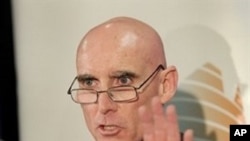Australia has postponed the launch of a controversial internet filter intended to protect children from violent and obscene content. Dubbed 'The Great Internet Wall of Australia', the filter was being designed to block offensive online material. Critics say it would erode freedom of speech.
Australia's mandatory Internet filter has been put on hold for up to a year to allow for an independent review of the type of content the system would prohibit.
The plan was to stop Internet users viewing web sites that showed child molestation, rape, bestiality and drug abuse.
The government insisted that banning such offensive material would protect Australia's children from the worst excesses of the Internet.
The proposal sparked intense reactions from web user groups. They accused Canberra of attempting the kind of censorship usually associated with more restrictive governments. Cyber-activists jammed key government websites as a form of protest.
Internet giant Google also criticized Australia's filtering plan, warning it could damage Australia's reputation as a liberal democracy and set a dangerous global precedent. There were also concerns the filter would slow down connection speeds for businesses and households.
Communications Minister Stephen Conroy says that the new Prime Minister, Julia Gillard wants a fresh approach.
"We both acknowledge there is concern in some sections of the community that the filter could get in the way of legitimate use of the internet," he said. "She encouraged me to engage with the industry and come up with a package of measures to address these concerns.'
In the meantime, Conroy says Australia's three largest internet service providers had agreed to voluntarily block a government-compiled list of child abuse web pages, which he described as featuring "abhorrent" content.
The minister is stressing that the government remains committed to its controversial filter plan, and insists that most Australians would not consider the banning of child pornography or bestiality websites as censorship.




